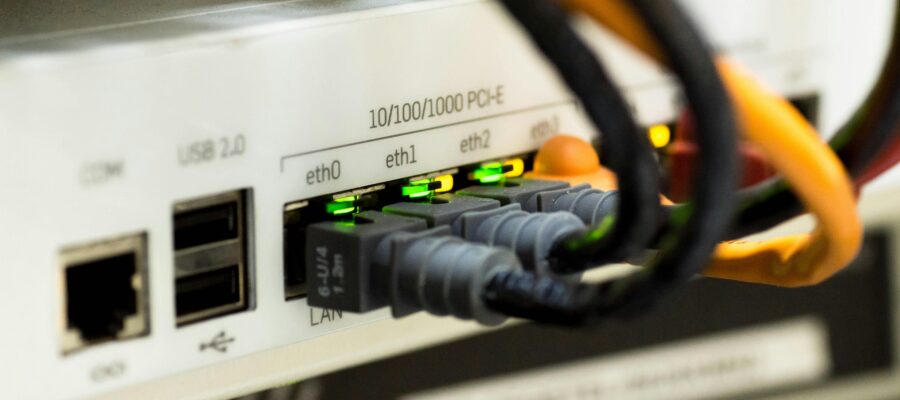The Domain Name System (DNS) is like the internet’s phone book. It helps turn easy-to-remember website names, like www.example.com, into numerical IP addresses that computers use to find each other. When you type a website address into your browser, DNS servers quickly look up the matching IP address and connect you to the site. This system makes browsing the internet easier and more user-friendly. Without DNS, we would have to remember long strings of numbers instead of simple names. Overall, DNS is essential for navigating the web smoothly.
Jump to...
Exploring Free DNS Services
ISP Protection
If not already using a VPN, using a secure DNS service is crucial for protecting your privacy from Internet Service Providers (ISPs) that may track your online activities. ISPs often log DNS queries, which can reveal the websites you visit. By utilizing external encrypted DNS services, such as DNS over HTTPS (DoH) or DNS over TLS (DoT), you can help shield your DNS requests from being intercepted. However, it’s important to note that while encrypted DNS can obscure your queries, your ISP can still see the IP addresses you connect to. Therefore, combining encrypted DNS with a VPN can further enhance your privacy by masking both your DNS queries and the websites you visit. For more insights on protecting your online privacy, check out this article on DNS and Privacy.
Privacy Importance in DNS
Privacy is a critical aspect of using any online service, this applies for DNS, Proxy, VPN, etc… Free DNS providers may collect user data for various purposes, including targeted advertising. Therefore, it is essential to choose a provider that prioritizes user privacy. Some free DNS services offer enhanced security features that protect against phishing attacks and data breaches. Understanding the privacy policies of these services can help users make informed decisions. For more insights on privacy concerns with free DNS, check this article.
DNS with VPN
If you are already using a VPN to enhance your online privacy and security just use the default DNS of your VPN service. Using the DNS service provided by your VPN is often better than using an external DNS, as it avoid any leaks. When you use your VPN’s DNS, your DNS queries are encrypted and routed through the secure VPN tunnel. This setup prevents your Internet Service Provider (ISP) or any potential eavesdroppers from tracking your online activities. Additionally, VPN DNS services typically do not log user data, further protecting your privacy. By relying on the VPN’s DNS, you can save yourself from potential security threats like DNS hijacking while enjoying a seamless browsing experience. For more information on the benefits of using a VPN DNS, check out this resource here.
Main free DNS
Free DNS services come with several advantages. First, they are cost-effective, allowing users to save money on hosting expenses. Many providers offer easy setup processes that require minimal technical knowledge. Additionally, these services often boast decent performance for small websites. Users can manage their DNS settings without needing extensive expertise. For more details on the pros of free DNS, visit this comprehensive guide.

Quad9: Best for Privacy and Security
Quad9 is a popular free DNS service known for its focus on security and privacy. It blocks access to malicious websites by using threat intelligence from various sources.
Pros: Quad9 provides robust security features that protect users from phishing attacks. It also does not log user data, enhancing privacy.
Cons: While Quad9 excels in security, it may not offer the same speed as some other providers. Users might experience slower response times during peak hours.
For more information about Quad9’s features, visit Quad9’s official site.
Quad9 DNS Addresses (blocklist, DNSSEC, and other security features)
Primary hostname: 9.9.9.9
Secondary hostname: 149.112.112.112
Quad9 DNS Addresses IPv6
Primary hostname: 2620:fe::fe
Secondary hostname: 2620:fe::9
Quad9 EDNS Client Subnet (ECS)
Primary hostname: 9.9.9.11
Secondary hostname: 149.112.112.11
Quad9 EDNS Client Subnet (ECS) IPv6
Primary hostname: 2620:fe::11
Secondary hostname: 2620:fe::fe:11
Quad9 Unsecured DNS (not recommended)
Primary hostname: 9.9.9.10
Secondary hostname: 149.112.112.10
Quad9 Unsecured DNS IPv6 (not recommended)
Primary hostname: 2620:fe::10
Secondary hostname: 2620:fe::fe:10
Cloudflare DNS: Strong Performance
Cloudflare offers a free DNS service known for its speed and privacy features. It provides DNS query encryption, making it a secure choice for users.
Pros: Excellent performance with minimal latency. Strong focus on user privacy with no logging of IP addresses.
Cons: Limited customer support compared to paid options. Some advanced features are unavailable in the free version.
Learn more about Cloudflare at Cloudflare DNS.
Cloudflare Standard DNS
For general DNS queries, Cloudflare uses the following hostnames:
Primary hostname: 1.1.1.1
Secondary hostname: 1.0.0.1
Cloudflare DNS Malware Blocking
Primary hostname: 1.1.1.2
Secondary hostname: 1.0.0.2
Cloudflare DNS Malware Blocking Only IPv6
Primary hostname: 2606:4700:4700::1112Secondary hostname: 2606:4700:4700::1002
Cloudflare DNS Malware and Adult Content Blocking
Primary hostname: 1.1.1.3Secondary hostname: 1.0.0.3
Cloudflare DNS Malware and Adult Content Blocking IPv6
Primary hostname: 2606:4700:4700::1113
Secondary hostname: 2606:4700:4700::1003
Cloudflare DNS over HTTPS (DoH)
For encrypted DNS queries via HTTPS, Cloudflare provides:
Primary hostname: https://cloudflare-dns.com/dns-query
Secondary hostname: https://1.1.1.1/dns-query
Cloudflare DNS over TLS (DoT)
For encrypted DNS queries via TLS, the following hostname is used:
Primary hostname: cloudflare-dns.com
OpenDNS: Strong Filtering Options
OpenDNS provides both free and premium options, focusing on security and content filtering. Their service includes parental controls, making it suitable for families.
Pros: Offers customizable filtering options and enhanced security against phishing attacks.
Cons: The free version lacks some advanced features available in the premium plan. Users may experience slower speeds during peak times.
Explore OpenDNS at OpenDNS.
OpenDNS Server hostnames
Primary hostname: 208.67.222.222
Secondary hostname: 208.67.220.220
DNS Watch: Easy Setup
DNS Watch is another free DNS provider that emphasizes user privacy and neutrality. It does not track or log user activity.
Pros: The service offers a straightforward setup process and provides reliable performance for general browsing needs.
Cons: However, it lacks advanced features such as content filtering or parental controls that some users might find beneficial.
To learn more about DNS Watch, you can visit DNS Watch’s website.
DNS Watch Hostnames
Primary hostname: 84.200.69.80
Secondary hostname: 84.200.70.40
These hostnames allow users to configure their devices or routers to utilize DNS Watch for enhanced privacy and security while browsing the internet. By using these DNS servers, users can avoid tracking and enjoy a more open internet experience.
Google Public DNS: well… Google… 🙁
Google Public DNS is one of the most widely used free DNS services. It offers fast response times and reliable performance. Users can benefit from enhanced security features like phishing protection.
Pros: Fast speed and reliable uptime enhance user experience. Google’s infrastructure ensures global reach.
Cons: Privacy concerns arise due to data collection practices. Users may feel uncomfortable with their data being stored by Google, and might be interested in Google alternatives.
For more information, visit Google Public DNS.
The IPv4 addresses for Google Public DNS are:
Primary hostname: 8.8.8.8
Secondary hostname: 8.8.4.4
Google Public DNS Addresses v6
If you are using IPv6, the addresses are as follows:
Primary hostname: 2001:4860:4860::8888
Secondary hostname: 2001:4860:4860::8844
Google Public DNS64 Addresses IPv6
For IPv6-only systems, Google also offers DNS64, which can be used with the following addresses:
Primary hostname: 2001:4860:4860::6464
Secondary hostname: 2001:4860:4860::64
How to Set Up Free DNS on your phone
Setting Up DNS on Android
- Open Settings: Start by accessing the Settings app on your Android device.
- Network & Internet: Tap on Network & Internet.
- Private DNS: Scroll down and select Advanced, then tap on Private DNS.
- Configure Private DNS: Choose the option for Private DNS provider hostname. Enter the desired DNS hostname, such as
8.8.8.8for Google Public DNS or9.9.9.9for Quad9. - Save Changes: Tap Save to apply your new DNS settings.
For more detailed guidance, you can refer to resources like GeeksforGeeks.
Setting Up DNS on iOS
- Open Settings: Begin by opening the Settings app on your iOS device.
- Wi-Fi Settings: Tap on Wi-Fi, then select the network you are connected to by tapping the information icon (i).
- Configure DNS: Scroll down to find the DNS section. Change the setting from Automatic to manual.
- Add DNS Servers: Enter your preferred DNS servers in the format of IP addresses (e.g.,
8.8.8.8for Google Public DNS) and tap on Save. - Reconnect if Necessary: You may need to disconnect and reconnect to your Wi-Fi network for changes to take effect.
For additional details, check out Apple’s support page.
Conclusion on DNS Host Names Top Providers
In conclusion, utilizing free DNS services offers numerous advantages, making it an attractive option for many users. Providers like Google Public DNS, Cloudflare, and OpenDNS deliver reliable performance and enhanced security features. Quad9 stands out for its focus on blocking malicious sites, ensuring a safer browsing experience. DNS Watch provides privacy-centric solutions that help maintain user anonymity online. Additionally, using VPN DNS can further enhance security by encrypting your DNS queries. While each service has its pros and cons, the key takeaway is that free DNS can save you money while improving your internet experience. By carefully selecting the right provider, you can enjoy fast, secure, and private browsing without incurring extra costs. Always consider your specific needs and prioritize privacy when choosing a DNS service.




